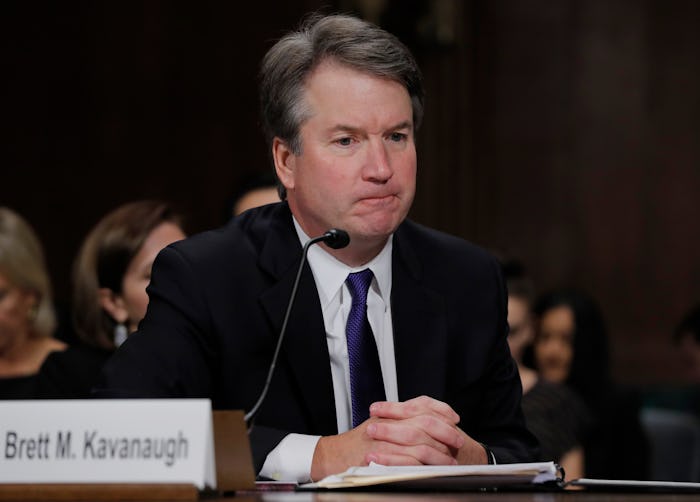News

Kavanaugh's 'Wall Street Journal' Op-Ed Is Missing Some Very Important Details
Last week, Supreme Court nominee and alleged sexual offender Brett Kavanaugh was called before the Senate Judiciary Committee to hear testimony from one of his accusers, Dr. Christine Blasey Ford. Afterwards, the judge was given an opportunity to respond. Kavanaugh denied all allegations of sexual misconduct leveled by Ford, as well as similar accusations by two other women: Deborah Ramirez and Julie Swetnick. On Thursday night, he took his claims of innocence straight to the people, but Kavanaugh's op-ed in the Wall Street Journal has some glaring omissions that some might find less than reassuring.
The op-ed benefits Kavanaugh in one way; the people will now have only his words to contend with, rather than getting distracted by the shouting and tears that were the main focal point of his Senate hearing. And without Senators or prosecutors guiding the conversation, he can be sure to steer clear of equally distracting topics, such as his fondness for beer, or his habit of working out with "guys at Tobin's house." He even had a week to go over it with a fine-toothed comb, and perhaps ask others to proofread it for him, in order to ensure that it cast him in the best light possible. But I suspect he didn't.
"I Am an Independent, Impartial Judge," the headline reads, and that would be a great start, if the public's only qualms with him were his track record on immigration, his support of so-called "religious freedom" laws, or the very real threat he poses to reproductive rights if confirmed. But that's not our biggest concern right now. The top priority for Kavanaugh should be trying to convince the American public, the Senate included, that he wasn't the belligerent, drunken predator that several people from his past have claimed he is (or at least was, during high school and college). Instead, the piece focused on the fact that he is a judge, he has a family, and he got emotional when he was "subjected to wrongful and sometimes vicious allegations." Here's what it doesn't mention:
Dr. Christine Blasey Ford
Ford, the first woman to publicly accuse Kavanaugh, sat before the Senate Judiciary Committee last week and recounted, in great detail, an attempted rape that she allegedly suffered at the hands of Kavanaugh, which she said still haunts her to this day.
Deborah Ramirez
Ramirez told the New Yorker that at a dorm-room party at Yale in the early 1980s, she played a drinking game with Kavanaugh and other students. "People would pick who drank," she said. She was picked often. After quickly becoming so drunk that she had to lie down on the floor, Ramirez claimed, Kavanaugh thrust his penis in her face. "I knew that's not what I wanted," she recalled, "even in that state of mind." Forced to make contact with him in order to get away, Ramirez said, she was "embarrassed and ashamed and humiliated." And as for the future judge, "Brett was laughing."
Julie Swetnick
In a sworn statement, Swetnick accused Kavanaugh of a pattern of behavior during his high school years that echos many details of Ford's allegation. She claimed that Kavanaugh would frequently "drink excessively and engage in highly inappropriate conduct," according to CNBC, including verbally and sexually abusing girls at parties. She further alleged that he regularly spiked girls' drinks with drugs, and was an accomplice in multiple gang rapes, including hers.
Also not included: "rape," "assault," "inappropriate," "crime," "innocent," "sympathy" or "sorry," to name a few. In fact, the only time he comes close to referencing the accusations is when he attempts to excuse his frequent outbursts before the Judiciary Committee, blaming them on "overwhelming frustration at being wrongly accused, without corroboration, of horrible conduct," and his "deep distress at the unfairness" of having to answer for it. He displays no compassion for the victims, something any decent person, wrongfully accused or not, should be expected to do. He could have claimed this was a case (or three cases) of mistaken identity, and that he believed the victims were assaulted, but instead, he reframed the allegations as acts committed against him, rather than acts he's accused of committing.
"My time in high school and college, more than 30 years ago, has been ridiculously distorted," Kavanaugh lamented. "My wife and daughters have faced vile and violent threats." But still, no mention of the vile and violent ordeals the three alleged victims were subjected to, nor the further trauma they've endured by coming forward (and yes, they've been threatened, too). "I was very emotional last Thursday," Kavanaugh wrote. "I testified with five people foremost in my mind: my mom, my dad, my wife, and most of all my daughters." And that's precisely the problem.